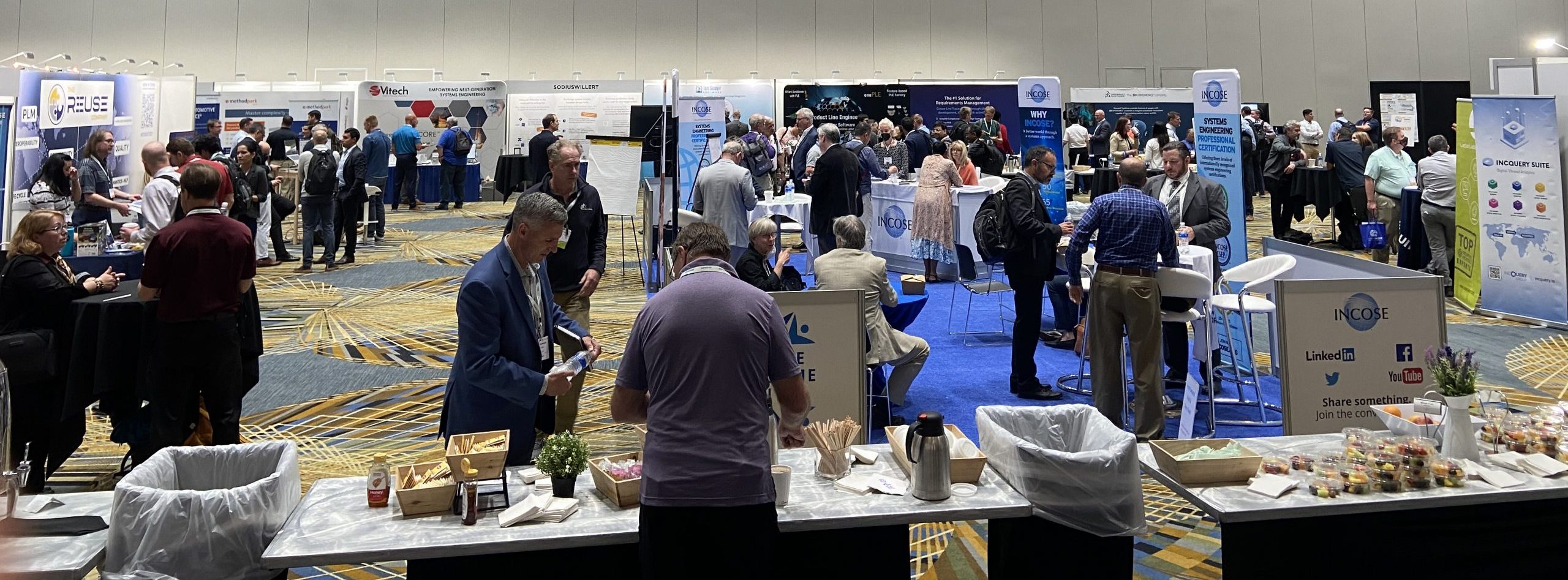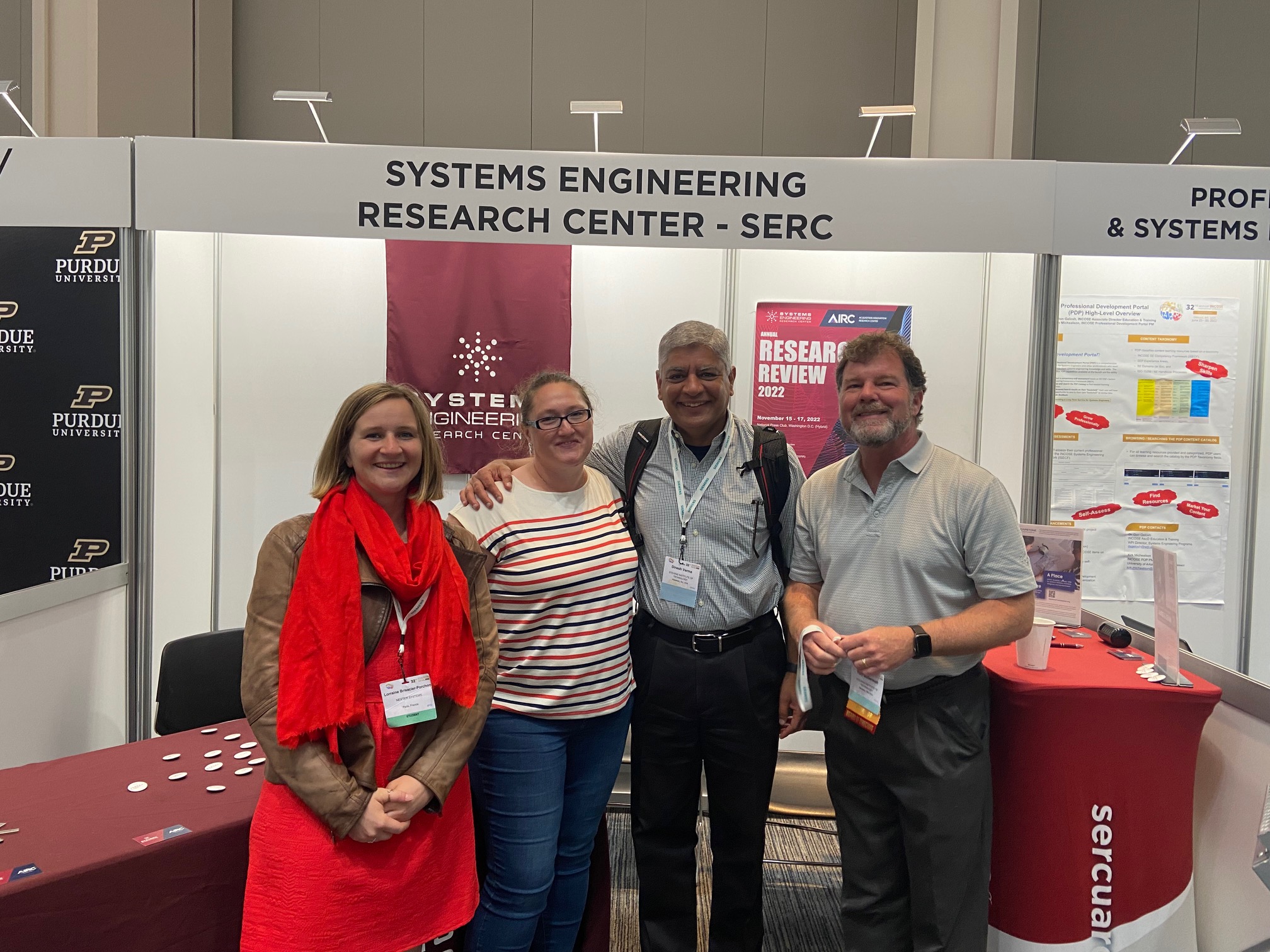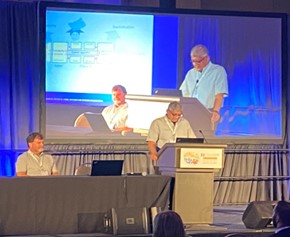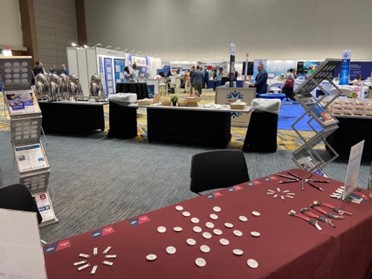The SERC Shares Research and Knowledge with the SE Community

Since its founding, the SERC has had a collaborative and strategic relationship with the International Council on Systems Engineering (INCOSE). Several SERC researchers hold leadership roles within INCOSE and every year many SERC research projects are featured at the INCOSE International Symposium (IS). IS2022 took place from 25-30 June in Detroit, Michigan, in a hybrid format. Over 500 individuals joined in person with over 400 joining sessions virtually.
June 25-26
The weekend of the IS consisted primarily of tutorials. This year, SERC researcher David Long put together the “Systems Engineering (SE) Fundamentals” track for the IS, and tutorials coordinated on the weekend:
- “Back to Basics: Fundamentals of Systems Engineering Success,” presented by Long (June 25)
- “Back to Basics: Thinking Like a Systems Engineering Practitioner,” by David Walden (June 26)
- “Systems 101: An Introductory Tutorial on Systems Thinking and Systems Engineering,” by Jawahar Bhalla (June 26)
The weekday portion of the IS consisted of the primary technical program:
June 27
Dr. Christopher J. Scolese, Director of the National Reconnaissance Office (NRO), delivered the keynote address. Scolese provided an overview of the systems capabilities of the NRO and expanded the discussion to include the systemic lessons learned from the COVID-19 pandemic. Approaches for improved efficiency and innovation to meet tomorrow’s challenges was a key theme of the talk. In concluding his speech, Scolese said, “That’s our job as engineers: to make the world a better place. As the world evolves, we have to evolve with it.”
Monday’s program included the SE Fundamentals track organized by Long and supported by SERC researcher Dr. Nicole Hutchison. The program included:
- “Engineering the Value Chain System” by Jon Wade (former SERC CTO)
- “Look in All the Corners: Gathering, Tracking, and Verifying Requirements” by Courtney Wright
- “Systems Architecting: A Recipe for Success” by Tom Strandberg
- “MBSE – The Natural Evolution of Systems Engineering” by Dr. Jon Holt
- “If You Thought Systems Engineering Was Fun, Wait Until You Try System of Systems Engineering” by Duncan Kemp
- “You’re a Systems Engineer: Own It!” by SERC researcher Nicole Hutchison
- “What Force is More Powerful Than Profit? An Exploration of Why Leaders Still Fail to Recognize the Value of SE” by Randall Iliff.
In the Digital Engineering track, Tom McDermott, SERC CTO, presented with Joseph Bradley on “Defining a Measurement Framework for Digital Engineering.” This presentation incorporated findings from SERC research tasks on SE Modernization.
June 28
Tuesday’s program kicked off with keynote speaker Carla Bailo, Center for Automotive Research, who provided insight into the systemic challenges in the automotive sector, with an emphasis on the electric vehicle (EV) market, current policies that create targets for the percent of the automotive market that should include EVs, and their implications. Bailo shared her vision of the “connected, multi-modal system” required to enable a transportation environment that can effectively incorporate autonomous systems.
Following the keynote, SERC Sponsor Nadine Geier, Office of the Executive Director, Systems Engineering and Architecture – Office of the Under Secretary of Defense for Research and Engineering, participated in the INCOSE President’s panel “Realizing the Systems Engineering Vision 2035.”
In the afternoon, Tom McDermott, SERC CTO, participated in the Tech Ops (INCOSE Technical Operations) panel on “Transdisciplinary Perspectives on Systems Engineering in and for Contested Cyber Environments.” McDermott shared the results of multiple SERC research tasks on cyber resilience.

Finally, McDermott and Dr. Kelly Alexander led a follow-up meeting to their strategy session on SE Modernization. McDermott currently leads several SERC tasks around SE Modernization.
June 29
Laura Doughty, Director, Peakfield Consultancy Ltd, kicked off Wednesday’s program with a keynote entitled “The Power of Connection: The Power of Influencing.” Doughty talked about the non-technical skills critical to the success of systems engineers, particularly on tactical empathy. This is the ability to understand what matters to stakeholders – colleagues, sponsors, users, practitioners, and researchers – and how they like to work. SERC Researcher Hutchison remarked that Doughty’s talk was, “Exactly what systems engineers need to hear. SERC research has consistently shown that these ‘soft’ skills are critically important for the type of work we do. We are the integrators and Doughty’s comments on influencing as a quality and one-on-one conversations where we do more talking than listening are spot on and reflect a strength of systems engineers that we need to celebrate and continue to hone.”
After the plenary session, SERC researchers Stephanie Chiesi (SAIC and Stevens) and Paul Grogan (Stevens) presented their paper, “A Surrogate Model Approach for Studying Performance and Cycle Time in Complex System Development.”
During the afternoon session, researchers Hutchison (Stevens) and Paul Wach (Virginia Tech) presented the paper “Digital Transformation in Acquisition: Using Modeling and Simulation to Advance the State of Practice”. This paper shared the results of some of the SERC’s research with the Defense Acquisition University (DAU), particularly around STEDE: Simulation Training Environment for Digital Engineering. This task seeks to create a modeling and simulation environment to be used for digital engineering training within the DoD, including multiple realistic but fictitious defense systems on which students can practice the skills they are learning.
June 30
On the closing day of the IS, SERC Executive Director Dr. Dinesh Verma moderated the President’s invited panel “Research Enabling the Discipline of Systems Engineering”. Panelists included SERC CTO Tom McDermott (Stevens); Dr. Martin Torngren (KTH) and Dr. Jacob Wesselius (ESI (TNO)). This panel brought together three premier research centers focused on diverse aspects of systems research. Center leaders presented their research priorities via brief remarks and then it evolved into an engaged discussion with about 120 attendees, in person and online. Verma reflected, “The endearing patterns [from the panel] were architecting in a complex world; converging towards a sparse information model for systems engineering that is adopted globally; and a need to continue this line of discussion.” As part of the President’s invited content, the INCOSE President and President-Elect both supported the panel by attending and participating in its entirety.

The IS concluded with the closing plenary featuring keynote speaker Christopher Davey, Global R&A Senior Global Manager for Systems Engineering, System Safety, Modeling & Simulation at the Ford Motor Company, who presented on, “Ford’s Connected-Agile, Model Based Systems Engineering and Simulation Journey . . . So Far.” Davey discussed Ford’s approach to balance sufficient and efficient simulation, including how artificial intelligence (AI) can be employed usefully as well as its approaches for thread in concepts such as safety throughout all aspects of systems models.

In addition to the many papers and panels by SERC researchers, the SERC had a presence in the Exhibit Hall throughout the IS. Amy Stinchcombe, SERC Senior Communications Manager, met with many conference attendees throughout the event. This sort of engagement is critical to ensuring that the community is aware of the current research portfolio and resources available through the SERC.
